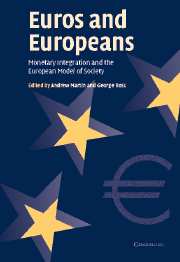Book contents
- Frontmatter
- Contents
- Preface
- List of contributors
- 1 Introduction: EMU and the European social model
- 2 The EMU macroeconomic policy regime and the European social model
- 3 Shaping a polity in an economic and monetary union: the EU in comparative perspective
- 4 Monetary integration and the French model
- 5 EMU and German welfare capitalism
- 6 Maastricht to modernization: EMU and the Italian social state
- 7 Constraint or motor? Monetary integration and the construction of a social model in Spain
- 8 The Netherlands: monetary integration and the Polder model
- 9 Belgium: monetary integration and precarious federalism
- 10 The political dynamics of external empowerment: the emergence of EMU and the challenge to the European social model
- 11 Welfare reform in the shadow of EMU
- 12 Industrial relations in EMU: are renationalization and Europeanization two sides of the same coin?
- 13 Conclusions
- References
- Index of names
- Index of subjects
13 - Conclusions
Published online by Cambridge University Press: 22 September 2009
- Frontmatter
- Contents
- Preface
- List of contributors
- 1 Introduction: EMU and the European social model
- 2 The EMU macroeconomic policy regime and the European social model
- 3 Shaping a polity in an economic and monetary union: the EU in comparative perspective
- 4 Monetary integration and the French model
- 5 EMU and German welfare capitalism
- 6 Maastricht to modernization: EMU and the Italian social state
- 7 Constraint or motor? Monetary integration and the construction of a social model in Spain
- 8 The Netherlands: monetary integration and the Polder model
- 9 Belgium: monetary integration and precarious federalism
- 10 The political dynamics of external empowerment: the emergence of EMU and the challenge to the European social model
- 11 Welfare reform in the shadow of EMU
- 12 Industrial relations in EMU: are renationalization and Europeanization two sides of the same coin?
- 13 Conclusions
- References
- Index of names
- Index of subjects
Summary
Monetary integration and EMU have fundamentally transformed the European political economy. EMU transfers monetary policy, the key instrument of macroeconomic policy and a core function of the modern state, to the exceptionally independent European Central Bank (ECB). At the same time, it strictly limits the member states' discretion in using fiscal policy, the main macroeconomic policy instrument remaining in their hands. Power has been more centralized and supranationalized in EMU than in any other European-level policy domain.
Member states have retained the power to shape the social policy and employment relations institutions at the core of the European social model, however. These institutions lie at the heart of domestic politics because of the central roles they play in the distribution of burdens and benefits among citizens. They help define voter expectations around which contenders for political power mobilize support and the normative basis of political legitimacy. With such basic issues at stake, national governments have consistently resisted transferring authority over core social model issues to the EU. EMU has not changed this.
The allocation of powers between the EU center and its constitutive units creates a European polity whose effects and even sustainability are problematical. Tensions between centralized macroeconomic policy and decentralized control over national social models are inherent in the interdependence of the two policy domains. Macroeconomic policy significantly affects the burdens on social policy and capacities to meet them. It also changes the distribution of bargaining power among actors in the labor market and politics.
- Type
- Chapter
- Information
- Euros and EuropeansMonetary Integration and the European Model of Society, pp. 309 - 330Publisher: Cambridge University PressPrint publication year: 2004
- 6
- Cited by

